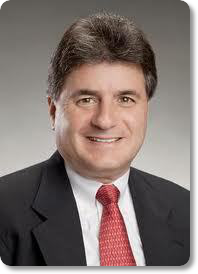 What is the most valuable project, program or innovation your IT organization has delivered in the last 12 months?
What is the most valuable project, program or innovation your IT organization has delivered in the last 12 months?
It is our ability to ready the organization for business use of smartphones, tablets and mobile applications. These devices are increasingly important to our business, not only for internal users but the wide range of customers throughout our business units.
If you had one piece of advice for CIOs who are embarking on the development and delivery of a mobile application solution, what would you offer?
You need to put yourself in the shoes of the ultimate customer and watch, observe, learn, and understand how they are going to use the device and application, and what functionality they need.
I see a lot of devices and applications developed from an IT perspective. But when developing solutions for your customers, you need to take yourself out of IT and put yourself into a user's shoes and see then how you would react to the application.
Also, be careful about underestimating how different mobility is from anything else you’ve done before. In the mobile world, there are so many other variables to factor into a solution; you can’t possibly understand them until you go through them.
| "Be careful about underestimating how different mobility is from anything else you’ve done before." |
What does your IT organization do best, apart from mobility?
We have become very good at putting ourselves in the shoes of the customer and understanding their needs and pain points. We still have a way to go to get where I believe we need to be -- and can be -- in terms of customer service. But the mindset is there to make it happen.
Have you used language -- a motto, a mantra, or a new name to rebrand the IT function?
At Wyndham Worldwide, whether you are a guest at one of our hotels or properties, an internal business partner, or a company associate, our motto is “Count on Me!” So, in IT, we’ve worked to bring that motto into our culture and make it a part of everything we do.
What career advice did you receive at some point in your career, that you think is valuable enough to pass onto others?
Early on in my career, my strong desire was to have an outside-the-U.S. assignment. I was doing quite well in a previous role when my manager came to me and said "Hey, great news! You're going international and you're going to get promoted as a result."
I thought this was great, and in my mind, I was packing for the Alps! I was getting my Swiss chocolates ready. I was thinking of a wonderful European assignment or some great location where I could travel and see all of Europe by car with the kids on vacation.
And my boss sat me down and said, “Well it's not Europe…it’s Japan” And I said, "Japan? But I don't want to go to Japan!”
He said "Listen, Chief, we can keep you here in the U.S. and you can keep doing what you're doing, but we expect major changes in the IT organization. The activities, costs, the spending will be reduced. If you stay here, you are not going to have any opportunities and you are not going to get promoted. You’ve been talking international experience and here’s a move up to the next level. This move to Japan is perfect for you. You may not realize it now, but this is good for you and your career. My advice to you is to accept the gift and take the opportunity." I did, and it was one of the best moves I ever made.
So, the advice is: Not everything that comes your way will seem perfect at first. Just because you can’t see it then, don't miss opportunities that, when you look in the rearview mirror later on, cause you to kick yourself for having passed on them.
How would you describe your own leadership style?
My goal is to build a team of senior people who can work with each other and drive the organization. I like to get to a point where I can turn them loose and don't need to be involved or engaged on a daily tactical basis. But before I get to that point, I tend to sweat the details. I will get personally involved to ensure that projects, support and other things are getting done. Until my leader tells me, "Chief, I've got it,” then I can step back.
Do you have an interview question you ask candidates to see if they're going to be a fit for your senior leadership team?
"What's the one thing -- whether it’s a project, product, or sticky situation -- that you are most proud of, and why?"
I ask that question to get a sense for scale. I get a sense for what motivates and drives candidates as well as what they have accomplished and overcome.
It also gives me a sense of how this person would approach our organization, our team, our work, and our priorities.
If you were not a CIO, what other profession would you have pursued?
I would have pursued architecture – buildings, not technology. I was always great at math, drawing and designing, but not so good at physics. If I were not a CIO, I might have shored up my physics capabilities and gone to a great architecture school and had a great career in this field.
And why did you decide to be a CIO instead?
I decided to become a CIO because I love IT. I love figuring out problems. I love driving solutions. And I love being able to take out mistakes, errors and problems through automation, and take away the manual effort.
About Walter Yosafat and Wyndham Worldwide
As Chief Information Officer for Wyndham Worldwide, Walter Yosafat is charged with working collaboratively with each of the business units to strengthen the IT function company-wide. Yosafat has more than two decades of experience in IT, e-business, and integration planning. Prior to joining Wyndham Worldwide in July 2010, he was SVP, Global CIO and CEO of Americas for Genpact Corporation, a publicly held company that outsources business processes globally. Prior to Genpact, he served as the CIO at Trane Inc., formerly American Standard, a global supplier of HVAC equipment.
One of the world's largest hospitality firms, Wyndham Worldwide's global portfolio includes 7,200 franchised hotels through its lodging segment, which includes familiar brands such as Days Inn, Howard Johnson, Ramada, and Super 8. The company also operates a vacation exchange and rentals segment, which has a relationship with 4,000 vacation exchange and rental properties in 100 countries. In addition, its Wyndham Vacation Ownership segment operates vacation ownership resorts in North America, the Caribbean, and the South Pacific.

Written by Martha Heller
Martha Heller is CEO of Heller and author of Be the Business: CIOs in the New Era of IT, and The CIO Paradox: Battling the Contradictions of IT Leadership.



